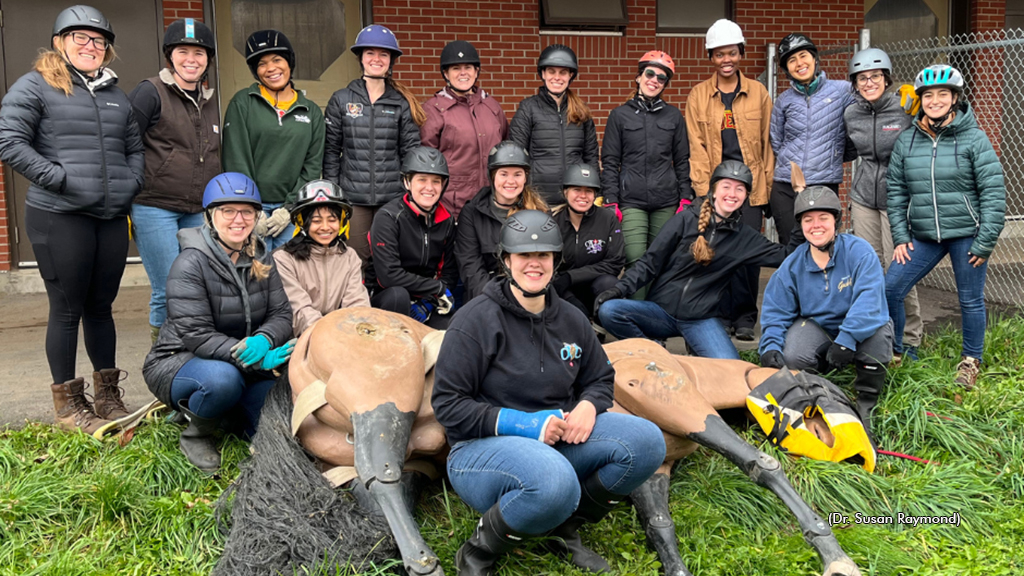
The final offering in 2023 of Equine Guelph’s Large Animal Emergency Rescue (LAER) training was a specialized workshop for veterinarians recently held at the University of Guelph campus.
On Saturday, Oct. 21, this course was presented by Equine Guelph & the Department of Clinical Studies, Ontario Veterinary College (OVC), University of Guelph. OVC students, interns and residents took part and learned practical skills to aid large animals and livestock in emergencies.
“The veterinarian plays an important role when they are called to assist in an emergency rescue situation,” said course facilitator Dr. Susan Raymond. "Having the training beforehand provides the knowledge to work within the incident command system with other responding agencies, while focusing on human safety and animal welfare."
Dr. Christopher Riley, BSc, BVSc(Hons), MSc, PhD, Dipl.ACVS, PGCIM, MANZCVS, CertTeReo, Professor & Chair of Department of Clinical Studies, Ontario Veterinary College, gave a wonderful presentation about the role of veterinarians attending a large animal incident scene.
“There is a need for veterinarians and other animal industry professionals to work with professional first responder agencies in emergency incidents involving animals,” said Riley. “Training provides participants with specialist skills that allow responders to collectively achieve the combined goals of human safety and optimal animal welfare outcomes.”
Equine Guelph would like to thank System Equine and Dwayne Job for loan of the horse trailer to practice what to do when a horse goes down in a trailer.
Course lead trainer Victor MacPherson, assistant trainers Katherine Hoffman and Riley McGilloway, and course facilitator Dr. Susan Raymond put the veterinarians and future vets to work learning various manipulation techniques that can be used in emergency situations. They practiced scene management and how to work within the incident command system.
Utilizing ‘Rusti,' a 700-pound, life-sized horse mannequin, participants learned how to perform forward and rear assists, sideways drags and cast horse rolls. They all had a chance to work with specialized reach tools, tow straps and package a horse on a glide for safe transportation out of sticky situations.
They all learned how to make an emergency halter that could fit any large animal with use of a rope. The vets also gained an appreciation for the difficulty fire fighters face when trying to perform rescue tasks that require dexterity while wearing their protective gloves and equipment.
Horse behaviour and how it may differ during emergency was top of mind in all the scenarios including a simulated rescue of a horse caught up in a fence line.
"It was an excellent course!” exclaimed participant Lucciana Recchi Ribeiro. “It provided me with new tools and techniques to deal with every day emergency situations, which we are exposed to constantly as veterinarians. I look forward to learning more from the team."
Equine Guelph’s LAER program continues to grow and expand its offerings to varied groups. If you are interested in helping to build this program or would like to discuss offering this program in your area or to your members, please contact Susan Raymond at Equine Guelph. Courses can be offered on a cost-recovery basis, or through sponsorship, to communities/individuals who would like to expand the reach of this training program.
Participants must be a minimum of 18 years of age. Equine Guelph encourages first responders, pre-service, law enforcement, animal welfare officers, veterinarians, vet. technicians, emergency animal response teams, horse owners, livestock producers and associations to reach out and book their training workshops for 2024.
(Equine Guelph)

